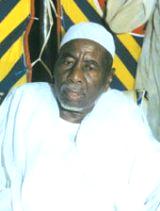Leading Sudanese Sufi Islamic leader dies
KHARTOUM, Sudan, Feb 21, 2005 (AP) — Sheik Abdul-Rahim al-Buraei, a top Sufi Islamic cleric who wrote mystical poems and helped peace efforts in Sudan, has died at the age of 82, the government said.
 Al-Buraei, a leader of the mystical Sufi form of Islam, died Sunday and was buried in his hometown of Zariba, about 60 miles southwest of the capital, Khartoum.
Al-Buraei, a leader of the mystical Sufi form of Islam, died Sunday and was buried in his hometown of Zariba, about 60 miles southwest of the capital, Khartoum.
State-run TV showed first vice president, Ali Osman Mohammed Taha, weeping as he took part in the cleric’s funeral.
“The Sudanese nation has lost one of its pillars, a man who was a model to be copied in working for people’s interests,” the Sudanese leadership said in a statement read on state-run radio and TV.
Born in 1923, al-Buraei became a follower of Sufism – Muslim mysticism that preaches moderation – and wrote many songs and poetry to convey Islam’s basic teachings and principles. His poems are commonplace on Sudan’s state-run airwaves.
He was known as a man who called for coexistence among the various Sudanese tribes and groups.
Al-Buraei, who became a sheik in 1944 after replacing his father, was one of the few religious leaders who met with exiled Sudanese rebel groups who had been fighting a 21-year civil war in southern Sudan. A peace treaty was signed in January.
“We are missing a man who had boosted peace efforts … and encouraged everybody to reach a peaceful solution,” said Yasser Arman, spokesman of the Sudan People’s Liberation Army, in the Independent daily Al-Sahafa.
Al-Buraei had hosted hundreds of disciples from west and east Africa, as well as Sudanese seeking to study Islam’s holy book – the Quran – and other Islamic principles.
He was awarded at least two honorary doctorates from Sudanese universities for his role in spreading Sufism throughout Sudan and Africa.
Sudan’s Islamic-oriented government has accepted the Sufi movement after its leaders committed not to challenge the official use of Sharia — or Islamic law — in Africa’s largest country.
